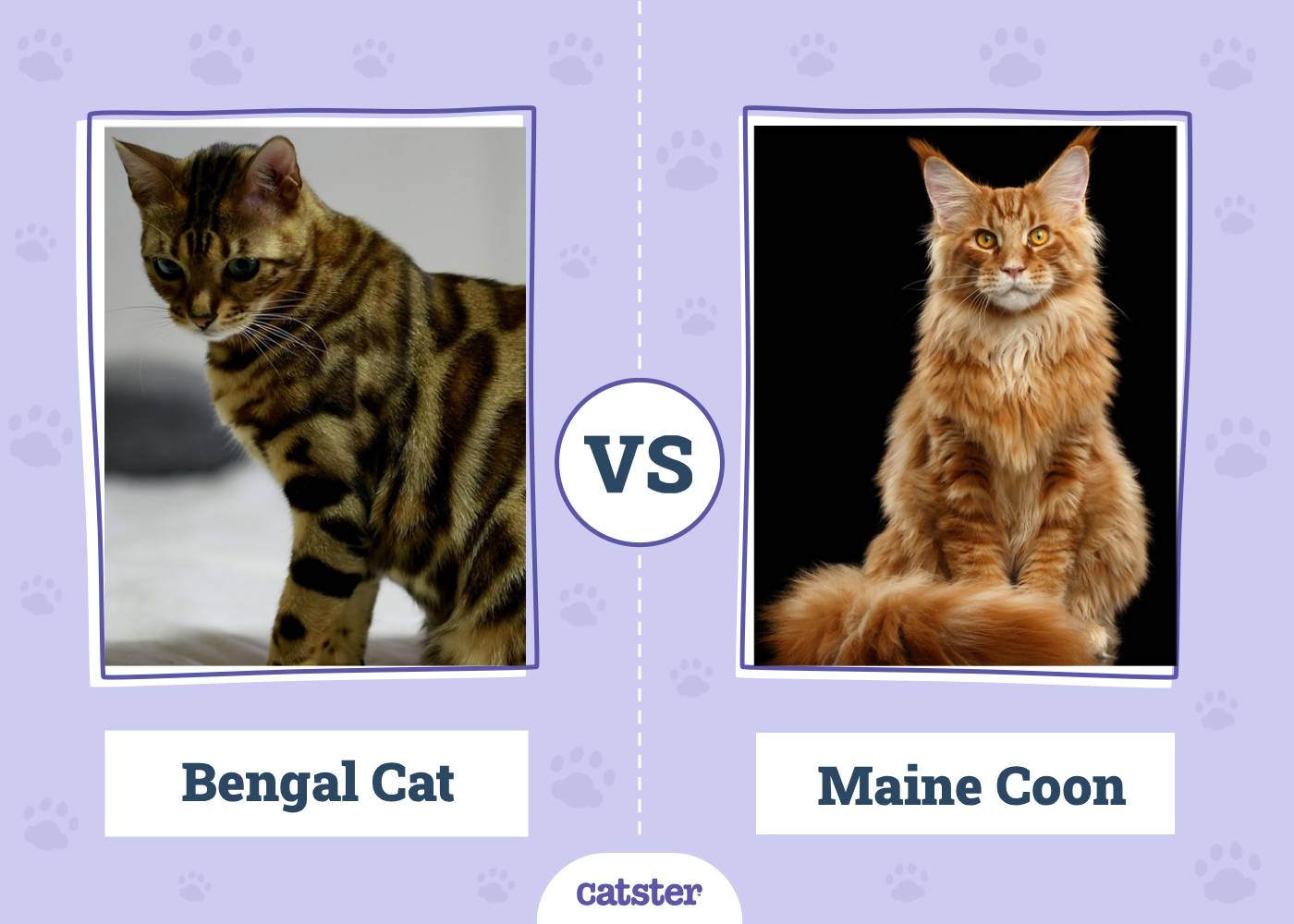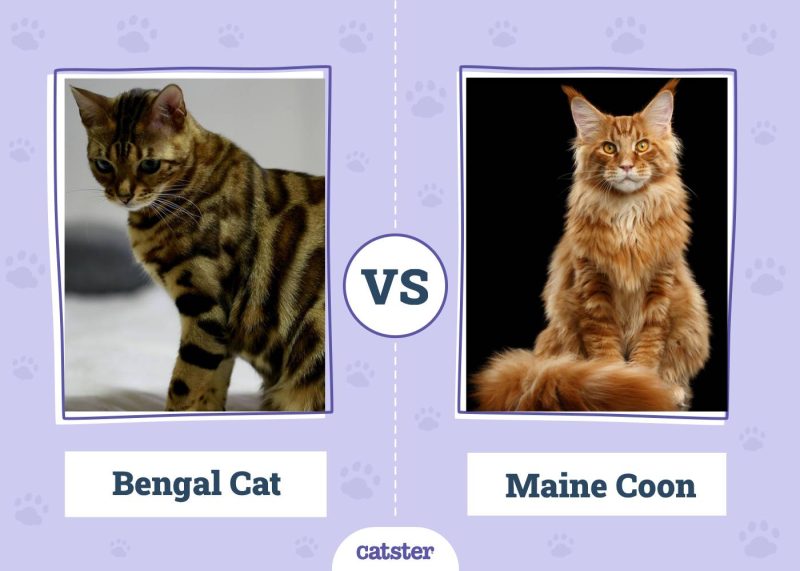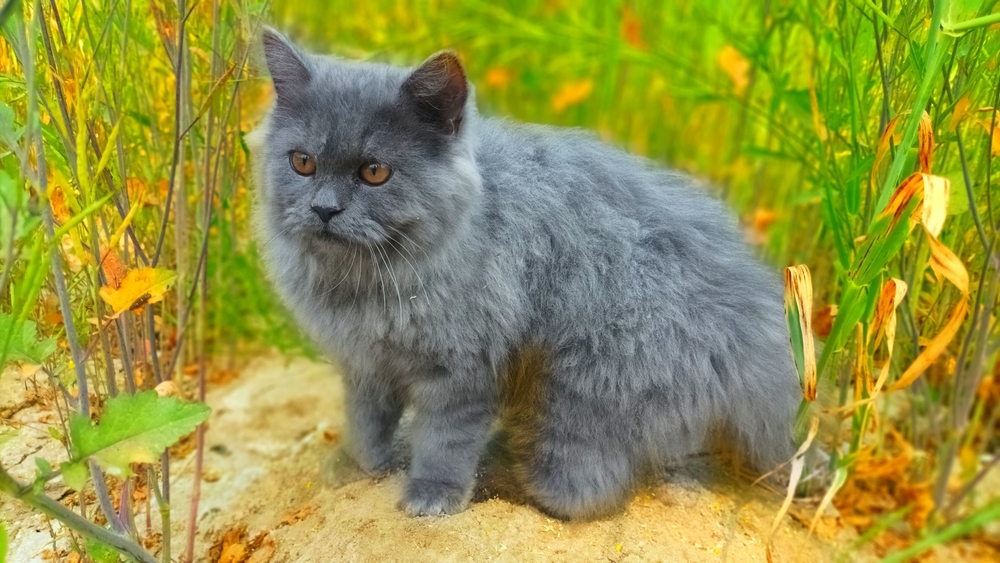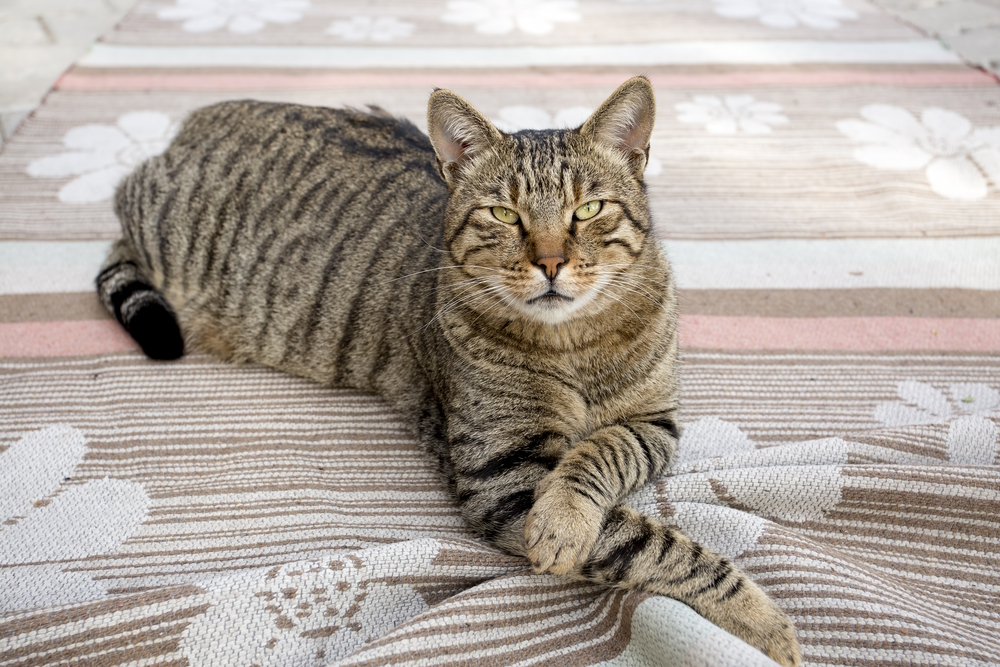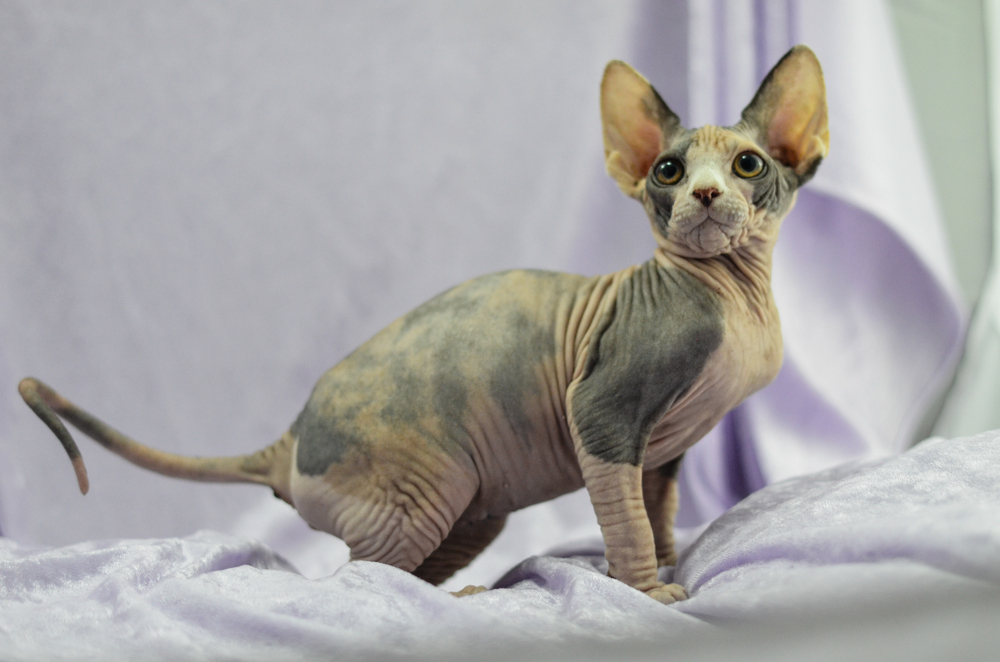Click to Skip Ahead
Visual Differences
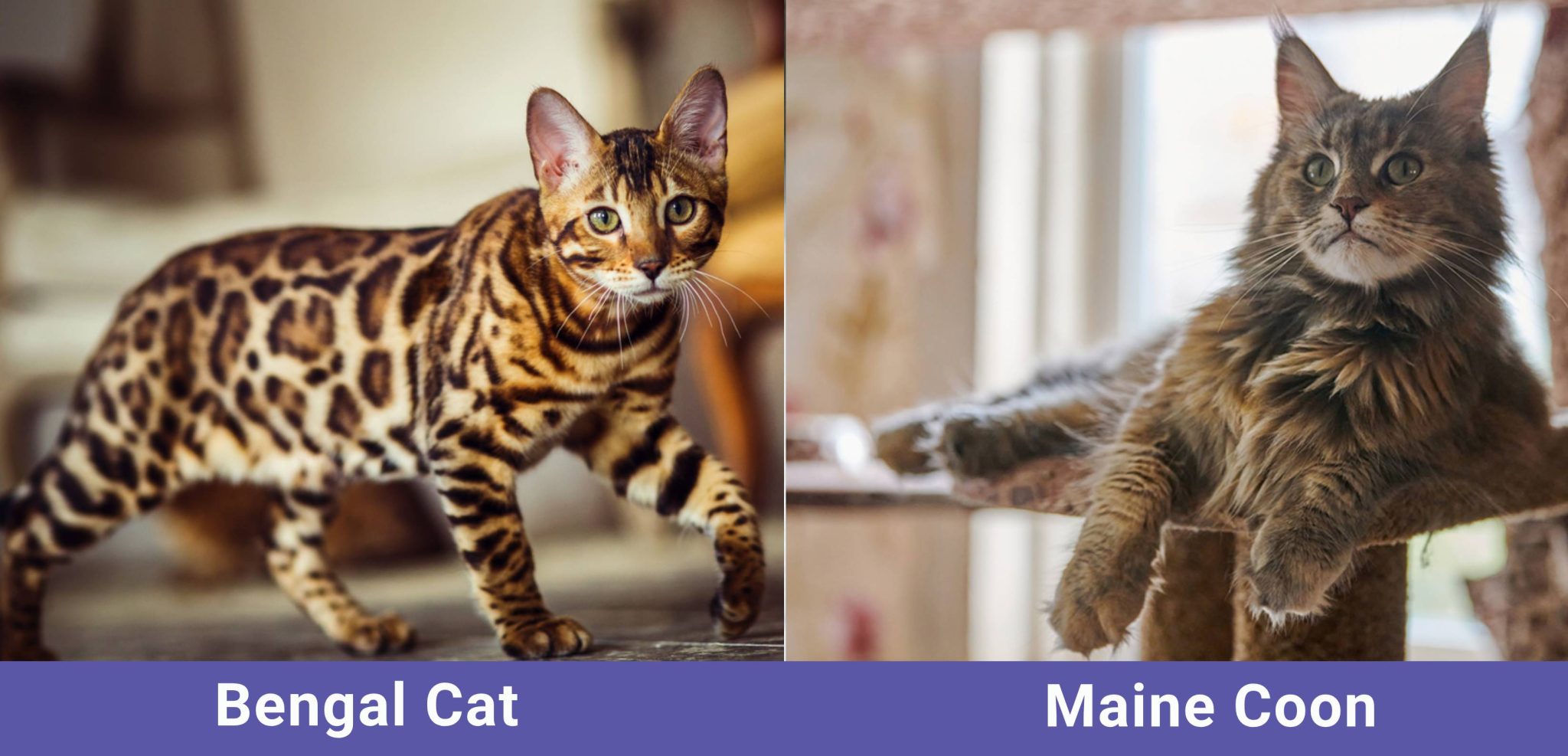
At a Glance
- Average length (adult): 14–18 inches
- Average weight (adult): 8–15 pounds
- Lifespan: 12–16 years
- Grooming needs: Weekly brushing
- Traits: Loving, intelligent, sweet, energetic, vocal
- Dog-friendly: Yes
- Average length (adult): 35–40 inches
- Average weight (adult): 9–18 pounds
- Lifespan: 12–15 years
- Grooming needs: Every other day brushing
- Traits: Gentle, friendly, playful, affectionate, smart
- Dog-friendly: Yes

Bengal Cat Overview
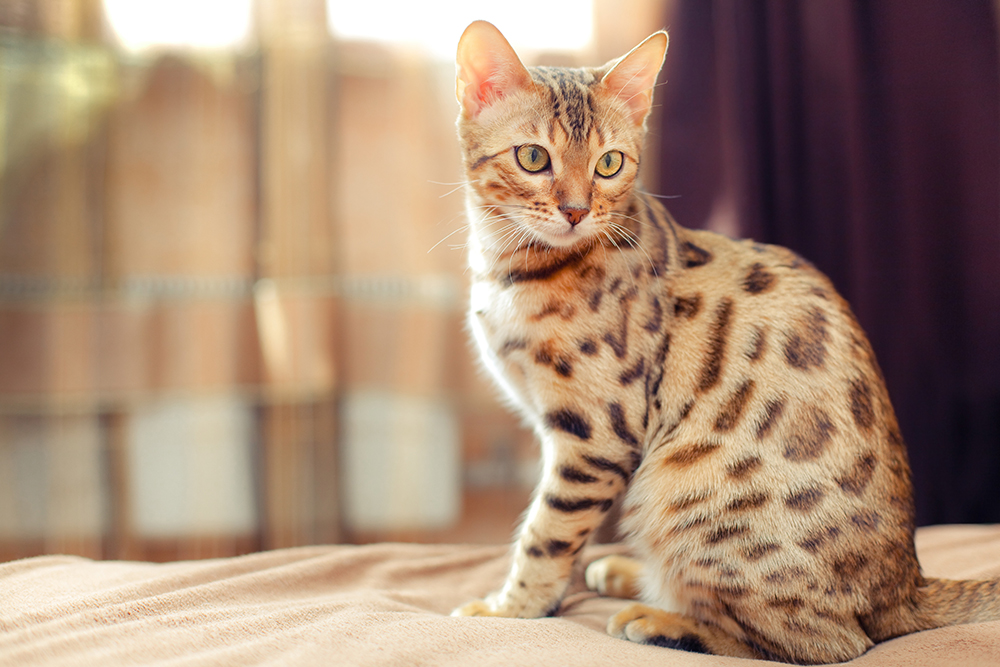
Although beauty is in the eye of the beholder, there is no denying the sumptuous appearance of the Bengal cat. This unusual breed is a real feast for the eyes, with exotic fur that makes them look like a mini leopard. Their large, emerald or aqua blue eyes bewitch everyone who meets their gaze. This splendid creature, however, has a strong character, is highly energetic, and incredibly talkative. The Bengal cat also develops a strong bond with their owner and does not appreciate being left alone for too long, much like a dog!
Origins of the Bengal Cat
The Bengal cat is the result of a cross between the Prionailurus bengalensis, a small Asian feline, also called the leopard cat, and a simple domestic cat. This cross was made by geneticist Jean S. Mills, who mated her black American Shorthair cat with a female leopard cat. She wanted to create the first hybrid cat, which would have both the appearance of a leopard and the gentle and affectionate character of a domestic cat.
The Bengal cat was accepted as a new breed by The International Cat Association (TICA) in 1986 and is one of the most popular breeds in the United States.
What Makes the Bengal Cat So Special?
Besides the majestic appearance, the Bengal cat has a unique personality that may not be everyone’s cup of tea. They are fiery but very endearing and make it clear to their owners when they need attention. Indeed, the Bengal cat is extremely vocal and expresses all their emotions through intense meows. They need almost constant physical and mental stimulation to satisfy their insatiable curiosity. It’s also fascinating to see how quickly this agile and intelligent feline learns tricks. Moreover, it is not uncommon for them to learn to open doors and even taps!
Another amazing feature of this breed is its love for the water. You will most likely see this little beast appear by your side when you are doing the dishes or even taking a bath.
So, one thing is certain: You will never be bored having this tiny leopard in your home!
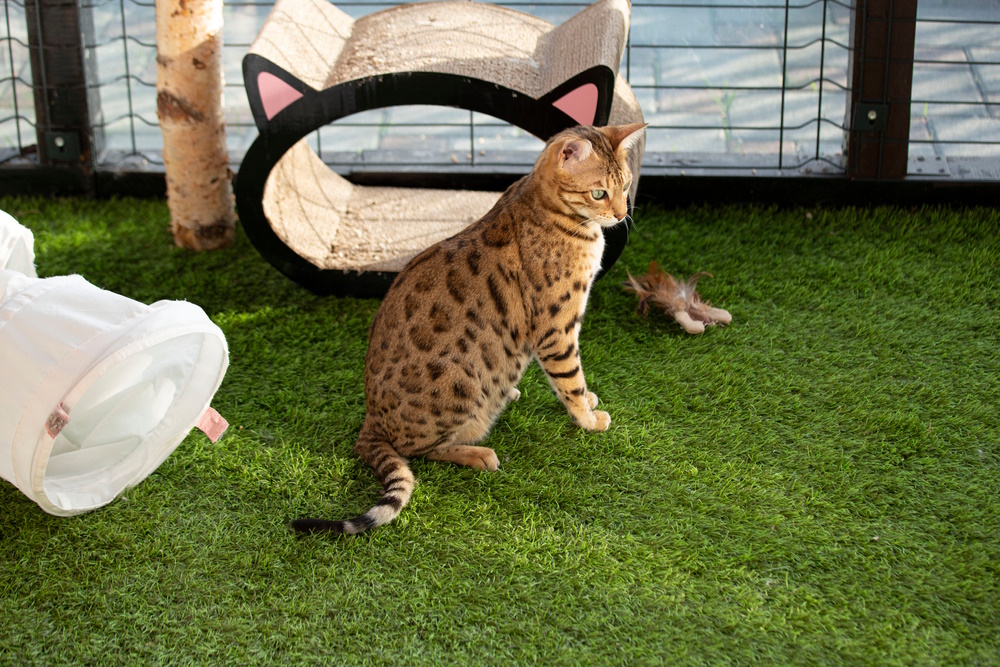
Health Considerations
Bengal cats are relatively hardy and healthy and can live up to 16 years. They can, however, suffer from certain health conditions, the most common being:
- Ear and eye infections
- Urinary tract infections
- Hypertrophic cardiomyopathy
- Patellar luxation
- Hip dysplasia
Special Considerations
Since the Bengal cat is such an athletic cat, they need enough space to run around and burn energy. Keep in mind that they love to climb and jump, so watch out for valuables! Also, it’s best to keep them inside the house, as their hunting instincts lead them to be a bit of a runaway.
Suitable For:
The Bengal cat will thrive in a family with children and even dogs because they will keep them entertained. And since this gorgeous feline demands a lot of affection, the ideal owner must love to cuddle, and be cuddled! In short, patience and availability are the keywords if you want to adopt a Bengal cat, and the best thing is to have two so that they can keep each other company.
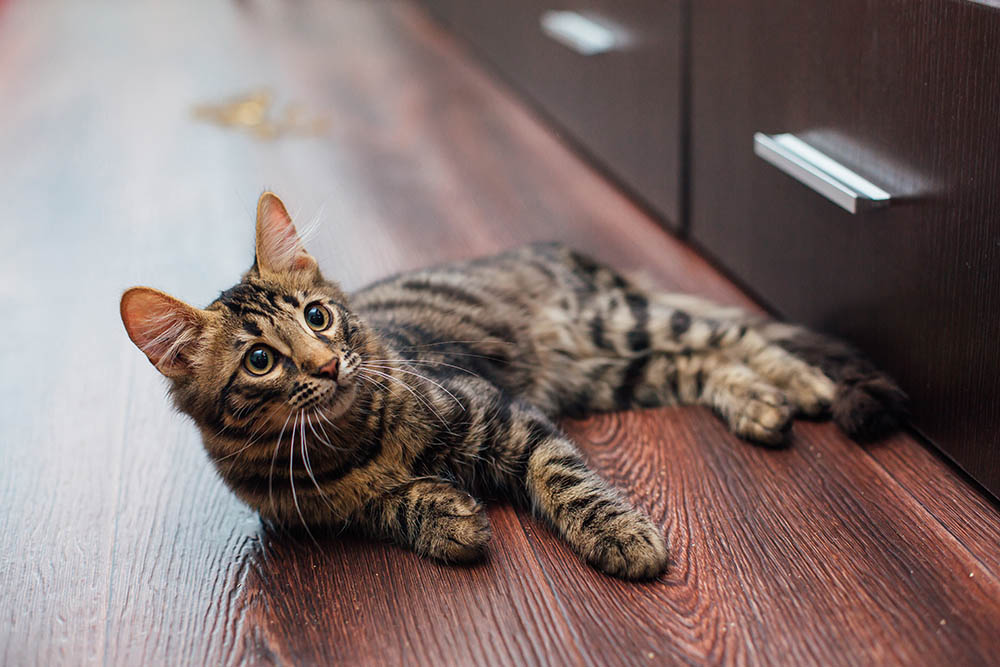
Pros and Cons of Owning a Bengal Cat
- They are extremely affectionate
- They are fun to watch, super smart, and easy to train
- They get along well with dogs and children
- They don’t shed a lot of hair
- They need almost constant attention
- Their high prey drive makes them dangerous around small pets
- They don’t like to be left alone for too long
- Their meows can be irritating to some owners

Main Coon Cat Overview
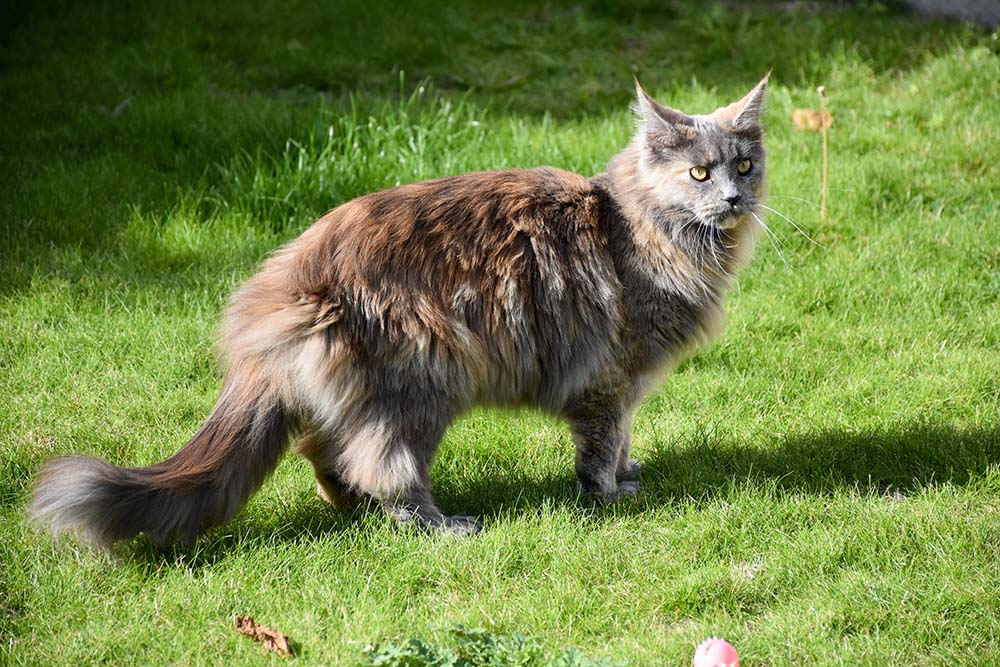
Despite their impressive physique, the Maine Coon is actually a gentle giant. Calm, peaceful, easy-going, the Maine Coon is a cat capable of finding its place in the family. They like to be taken care of, love cuddles, and are particularly affectionate towards their owners. They live very well in an apartment and appreciate the company of children.
But even if the Maine Coon is a cat with a rather calm temperament, they are nonetheless playful and curious. However, they will not jump everywhere or climb on all the furniture in the house. The Maine Coon is also vocal and communicates with their owners using a variety of sounds, not just simple meows. This makes them very entertaining members of the family!
Origins of the Main Coon
The origin of the Maine Coon is rather mysterious. It would be the only natural cat breed from North America that originated in the state of Maine in the United States, hence their name. For a long time, it was believed that the Main Coon was a cross between a cat and a raccoon. Years have passed, science has evolved, and we now know that it is genetically impossible.
The Main Coon would rather be an evolution of a European-type short-haired cat. These cats were present in the boats of the first settlers in order to hunt the vermin. Once they arrived in North America, these cats would have evolved through crossbreeding with American wildcats by adopting physical characteristics (denser and warmer fur and a larger size), allowing them to survive in this hostile environment.
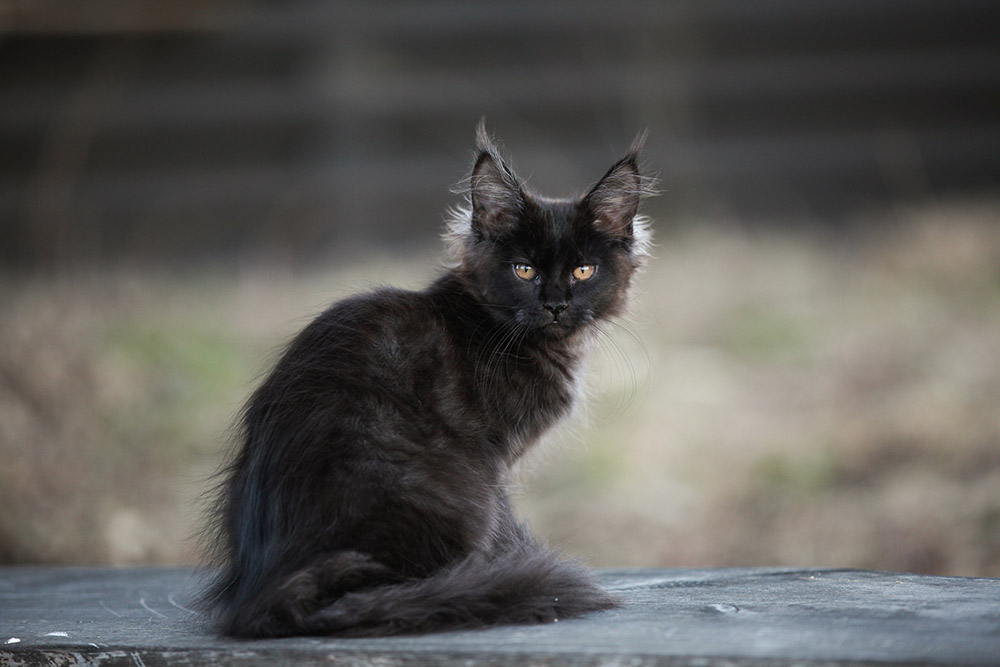
What Makes the Main Coon So Special?
How can you resist the charm of this massive feline that looks so much like the king of beasts? It is not for nothing that this breed of cat has been the most popular in the world for the past 20 years. In addition, the Maine Coon holds just about every world record for length and weight. Some male individuals can reach nearly 40 inches in length and weigh up to 25 pounds!
But don’t be intimidated by their strong build and piercing gaze. The Maine Coon is actually a big teddy bear. They are indeed very sweet, affectionate, and gentle, which makes them wonderful companions for the whole family. And just like the Bengal cat, the Maine Coon has the particularity of loving water and will not hesitate to take a dip in the bathtub!
Health Considerations
The Maine Coon is a massive cat, sure, but that doesn’t mean they should be overfed. It is essential to carefully monitor their diet and not exceed the portions suggested by your veterinarian, as this breed is prone to gaining weight easily.
And just like dogs, the Maine Coon can suffer from hip dysplasia. Furthermore, obesity is a major risk factor in the development of hip dysplasia, as the extra weight borne on the hip joints worsens the cat’s condition.
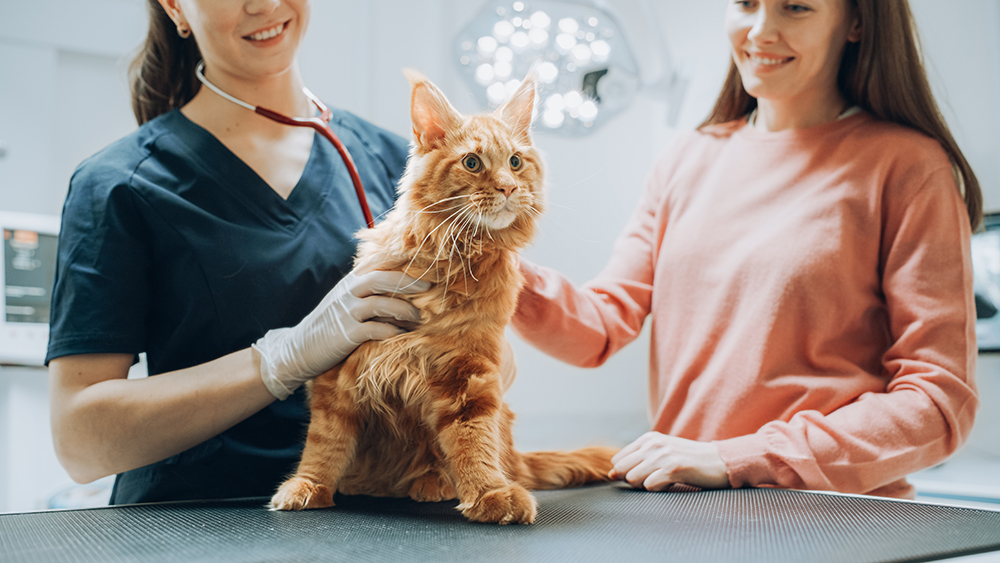
Special Considerations
Although rustic, the Maine Coon requires regular maintenance. You must brush their thick and long fur at least two to three times a week to prevent it from getting tangled. Then, you must comb it to make it smooth and silky. Keep in mind that the Maine Coon molts in spring and summer, notably losing the long hairs of the mane. To prevent your cat from swallowing an excessive amount of dead hair, daily brushing is recommended during the molting period.
Suitable For:
Although the Maine Coon is an adorable and undemanding four-legged companion, their size must be taken into account. Males can become heavy to carry and difficult to handle, especially for an elderly person. In addition, it often happens that they knock objects off the shelves while trying to sneak in. Litter boxes, toys, cushions, and cat trees will need to be purchased based on this breed’s massive size in order to be safe, enjoyable, and comfortable for this gentle giant.
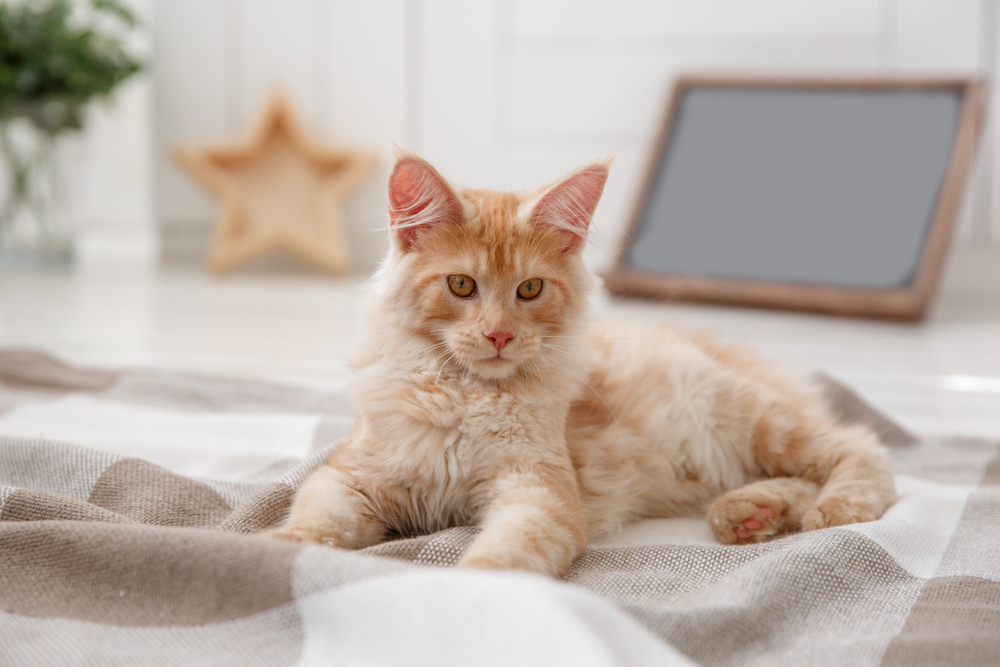
Pros and Cons of Owning a Main Coon
- They are affectionate and intelligent
- They can get along with dogs and other cats
- They are suitable for apartment living
- They are very hardy and adapt to harsh climates
- They are calm and very pleasant to live with
- They are prone to being overweight
- Their massive size can be problematic for some people
- They need regular grooming

Which Breed Is Right for You?
The beauty of these two cat breeds is absolutely breathtaking. In addition to being splendid representatives of the feline race, both breeds are super affectionate and love spending time with their humans. They are intelligent, playful, cuddly, vocal, and of rather robust health. So, how do you choose the right breed for you and your family?
If you prefer a cat that is more active, playful, talkative, and dependent on you, the Bengal cat might be the right choice. But if you desire a calmer, quieter, yet huge furry companion, you’ll be charmed by the massive Maine Coon.
But in the end, it all comes down to one simple question: would you rather have a mini leopard or a tiny lion in your home?
You might also like:
- Bengal Maine Coon Mix Cat Breed Info: Pictures, Temperament & Traits
- Maine Coon vs Turkish Angora: The Differences (With Pictures)
Featured Image Credit: Left – lshman000, Pixabay | Right – Seregraff, Shutterstock

